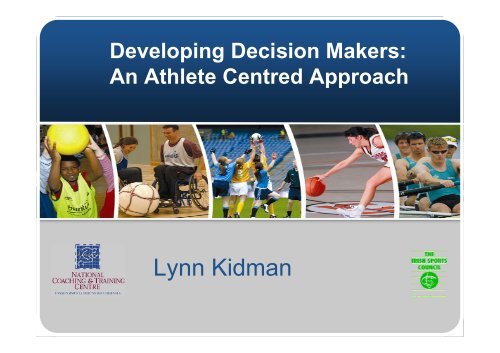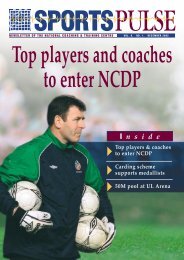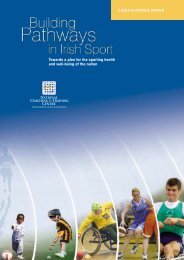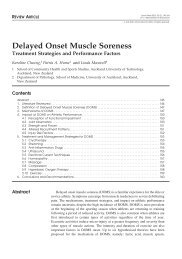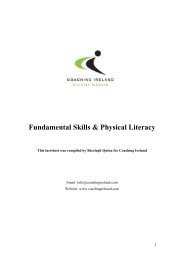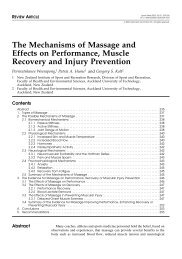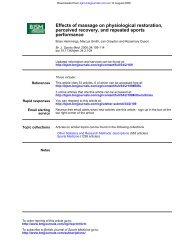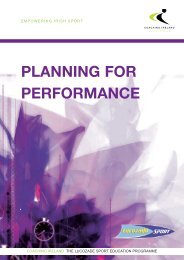Lynn Kidman Keynote Presentation - Coaching Ireland
Lynn Kidman Keynote Presentation - Coaching Ireland
Lynn Kidman Keynote Presentation - Coaching Ireland
Create successful ePaper yourself
Turn your PDF publications into a flip-book with our unique Google optimized e-Paper software.
Developing Decision Makers:<br />
An Athlete Centred Approach<br />
<strong>Lynn</strong> <strong>Kidman</strong>
Attributes:<br />
• Leadership<br />
• Athlete centred<br />
• Teaching Games for Understanding<br />
• Questioning
Leadership<br />
• Sport is dominated by staunch conformists who<br />
wish to preserve status quo at any cost (Lombardo,<br />
1987)<br />
• Coach centred vs athlete centred<br />
• People will rise to a challenge if it is their challenge<br />
• Thinking is critical – find the answer for yourself<br />
• Setting up learning environment is essential to<br />
enable decision making
Wairua - Oneness<br />
• Quality Leadership<br />
• Success vs Winning<br />
• Spirituality – individual’s well being (holistic)<br />
– Attitudes and values<br />
– respect and trust<br />
– caring and concern for others<br />
– Sense of belonging<br />
– Significance<br />
– Learn from mistakes (search for continuous<br />
improvement)
Athlete-centred <strong>Coaching</strong><br />
• Awareness<br />
• Responsibility<br />
• Ownership<br />
• Self-belief
“People with high EQ will hold<br />
back their knowledge to get<br />
the best out of others”<br />
Sir John Whitmore
Change & Improve<br />
Understand<br />
Analyse<br />
The<br />
Learning<br />
Awareness<br />
Robbie Deans<br />
Process
Athlete Decision Making<br />
• <strong>Coaching</strong> is about enabling the athletes to learn<br />
• Create situations for athletes to learn, either<br />
through discovery or through problem solving.<br />
• Gensemer (1980) reinforces: “the execution of<br />
most motor skills is essentially a fluid endeavor.<br />
The accomplishment of any motor performance<br />
generally requires that the performer be either<br />
versatile, adaptable, or self-expressive…. In no<br />
case, however, is everything static. Situations are<br />
always changing” (p. 54).<br />
• Developing Intuition
What is Intuition?<br />
It is decision-making without conscious thinking or analysis.<br />
‘The power of thinking without thinking’<br />
• It is based upon all of our previous learning experiences.<br />
‘Habits learned from experience’<br />
• It works subconsciously, below the level of cognitive<br />
awareness.<br />
‘Instinct’<br />
• In times of Decision Making complexity and pressure, it<br />
is:<br />
‘The most effective form of decision making’<br />
– Both conscious analysis and anxiety interfere<br />
with intuitive DM. Robbie Deans
Decision Making<br />
• Treat decisions and judgements as skills<br />
• Focussed practice & questioning/feedback<br />
can improve them<br />
• Work more on improving recognitional<br />
decision skills rather than analytical<br />
i.e. size up the situation & RECOGNISE the<br />
appropriate course of action rather than<br />
compare other courses of action
Recognitional Decision Skills<br />
• Key question is not “what do I do…?”<br />
• It’s “what’s going on…?”<br />
• What they see tells them what they<br />
should do<br />
• There are no quick fixes – experience is<br />
the key
How…?<br />
Deliberate practice/guided discovery<br />
everything done for a PURPOSE….<br />
• Simulation runs<br />
• Game sense activities<br />
• Questioning approach<br />
• Accurate feedback
What is Teaching Games for<br />
Understanding (Game Sense)?<br />
• An approach that guides athletes to discover<br />
and develop the game.<br />
• The game is the teacher, enables decision<br />
making<br />
Purpose<br />
• To provide a situation for athletes to<br />
understand the game they play while<br />
capitalising on the intrinsic motivation.<br />
– Rod Thorpe
The art of Questioning is ……the<br />
art of guided learning<br />
Thinking itself is questioning<br />
John Dewey
Types of Questions<br />
Close-ended questions (low order thinking)<br />
• What or where questions: (simple or single answer)<br />
– What part of the foot do you use to kick a goal?<br />
– Where should you aim when shooting in netball?<br />
– What is the distance between the wickets?<br />
Open-ended questions (high order thinking)<br />
• Application, Analysis, Synthesis, Evaluation<br />
– How can we get the ball down the court quickly?<br />
– Why should we push the defence to the sideline?<br />
– Why should the field be placed this way?<br />
– How many different ways can we balance?
Other Decision Making<br />
Ideas…<br />
• Situation Awareness exercises (video) and DMGs<br />
(computer games)<br />
• Multi-level decisions – how different team members<br />
perceive the same situation<br />
• Everyone know the game plan (be part of it!)<br />
• “what ifs….?” for each opponent, each game<br />
• Structured game review systems – team and<br />
individuals<br />
• Decision making critique – debrief decisions<br />
made/not made or made/not carried out<br />
• Visualisation – mental rehearsal to complement<br />
DMGs, physical practice and games
To lead people,<br />
walk beside them ...<br />
As for the best leaders, the people do not notice their<br />
existence.<br />
The next best, the people honour and praise.<br />
The next, the people fear;<br />
and the next, the people hate ...<br />
When the best leader's work is done the people say,<br />
"We did it ourselves!"<br />
When the effective leader is finished with his work, the<br />
people say it happened naturally.<br />
(Lao Tzu)


